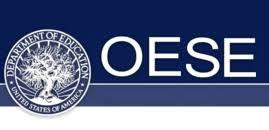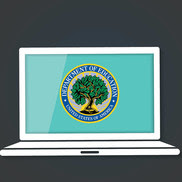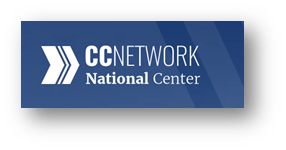
From the Deputy Assistant Secretary

Happy New Year! Looking back, it’s been quite the year, with ups and downs. I know we were all looking forward to a brighter outlook in 2022, but we seem to be moving into a time of unexpected uncertainty. I am heartened that we know much more about how to safely implement in-person learning, including layering protection, such as vaccines, masking, social distancing, and test-to-stay. We will continue to do everything we can to support your critical efforts to support teachers, school personnel, and school leaders. Equally important is support to families, and that is the focus of this month’s newsletter.
This month’s theme is Strengthening Family, Community, and Partner Connections. We often discuss the relationships among state educational agencies (SEAs), local educational agencies (LEAs), schools, teachers, and students. But we also recognize that our schools don’t exist in a vacuum and know that what happens in families and in communities impacts the learning in our schools as well. This month we highlight the Statewide Family Engagement Centers (SFEC). The 11 centers provide support to strengthen the family and school partnership. We also provide resources from the National Comprehensive Center, Regional 9 Comprehensive Center, and Region IV Equity Assistance Center.
January is also National Slavery and Human Trafficking Prevention month. We know that human trafficking has increased during the pandemic, particularly through online recruiting and grooming. We need everyone in our communities to be on the alert for signs of human trafficking. We continue to provide resources for schools and communities to stop human trafficking. We have a number of resources slated to be released this month, including a staff development series and an easy-to-use communication resource for schools and districts to support their trafficking prevention efforts. We are also planning a series of webinars to inform educators about recognizing, understanding, and preventing human trafficking in and around school environments. By working together and bringing awareness to this issue, we can help prevent human trafficking.
Wishing you a safe, healthy, and productive 2022! I hope to see some of you at the National ESEA Conference in February!
Ruth Ryder
|

Featured Technical Assistance Centers: Statewide Family Engagement Centers

The Statewide Family Engagement Centers (SFEC) program is authorized under title IV, part E of the Elementary and Secondary Education Act of 1965, as amended (ESEA). The purpose of the SFEC program is to provide financial support to organizations that deliver technical assistance and training to SEAs and LEAs in the implementation and enhancement of systemic and effective family engagement policies, programs, and activities that lead to improvements in student development and academic achievement. The Secretary is authorized to award grants to statewide organizations (or consortia of such organizations) to establish SFECs that:
- carry out parent education and family engagement in education programs, and
- provide comprehensive training and technical assistance to SEAs, LEAs, schools identified by SEAs and LEAs, organizations that support family-school partnerships, and other such programs.
Grants were first awarded to 11 grantees in 2018. Some examples of SFEC resources include:
|

Meet Department Staff Member Beth Yeh
Learn more about Beth Yeh, federal program officer for the Statewide Family Engagement Centers program.
How long have you been at the Department?
- I’ve been at the Department for 21 years.
What do you most enjoy about working at the Department?
- My favorite thing about working at the Department is all the interesting and caring people I’ve met.
What is one thing you’d like to see happen for the SFEC Program in the next year?
- This program was first authorized in 2018 and only 13 states have centers. The grantees are currently in their fourth year of the grant and are producing a variety of excellent resources. I hope in the next year more people learn about the program and are able to use the resources to help families and schools work together more effectively.
|

Centers for Disease Control and Prevention Updates

COVID-19 Data Dashboard
The Department, in collaboration with the CDC, has launched a COVID-19 data dashboard to help the public keep track of the impact of COVID-19 on K-12 schools. Data will be updated each week, and where possible, the information is presented geographically so that educators and families can understand the impact of COVID in their communities.
|

Technical Assistance Resources: Strengthening Family, Community, and Partner Connections

Building School-Community Partnerships
These resources by the National Comprehensive Center can assist school districts, schools, and community organizations in engaging a diverse set of partners, implementing effective consultation practices, and building and sustaining working relationships. Topics include establishing data sharing agreements between community-based organizations and schools, sharing best practices in youth mentoring, and building school-community partnerships to advance equity, among others.
Literacy Priorities in Local District ARP Plans
This tip sheet by the National Comprehensive Center is an interactive tool intended to guide state-level staff as they review, strengthen, and monitor LEAs’ plans for American Rescue Plan (ARP) funding to accelerate literacy learning to ensure the return on investments in the form of student success. The guide includes important questions to consider, along with tips and relevant links for more information.
Prioritizing Teachers: Importance of Self-Care and Adult Social and Emotional Competencies
This brief by the National Comprehensive Center highlights two critical components of professional development trainings for educators – self-care and adult social and emotional competencies (commonly referred to as “adult SEL”). The brief provides guidance for practitioners at the school, district, and state levels on how to develop a tailored approach for conducting professional development for educators, by fostering their well-being and building their capacity to engage in trauma-informed pedagogy.
|

Key Levers for Successful School-Family Relationships
This blog post by the Region 9 Comprehensive Center highlights levers for successful school and family engagement. These levers include making family engagement part of a larger ecosystem of support, leading by strengthening relationships and setting a welcoming tone, offering training and support to help families build their skills, and giving families a seat at the decision-making table.
|

Leveraging National Service in Your Schools: A Superintendent’s/Principal’s Toolkit to Utilizing National Service Resources
AmeriCorps has released an updated tool kit, aligned with ED’s Reopening Roadmap, to help schools leverage national service to support with their daily work. You can find additional information on AmeriCorps’ education-focused work on the “What We Do” page of its website.
|

Office of Innovation and Early Learning News

$182 Million Announced for the Education Innovation and Research Grants
On Dec. 13, U.S. Secretary of Education Miguel Cardona announced $182 million in new grant awards to 30 school districts, institutions of higher education (IHEs), and nonprofit organizations across the United States as part of the Education Innovation and Research (EIR) program. These grants will support local efforts to develop, implement, and take to scale entrepreneurial and evidence-based projects that have the potential to improve academic achievement for underserved students.
Twenty-six of the thirty grantees address at least one of the priorities included in the competitions: addressing the impact of the pandemic and promoting equity in student access to high-quality educational resources and opportunities.
With these grants, the EIR program is supporting:
- over $46 million to grants serving rural areas,
- over $67 million to grants focused on science, technology, engineering, and math (STEM) education (including computer science), and
- over $73 million to grants supporting social and emotional learning (SEL) projects.
A full list of selected grantees can be found on this page.
|

What's New from the Institute of Education Sciences

Regional Education Laboratory (REL) Report: Student Learning Changes during the COVID-19 Pandemic in Illinois School Districts
Leaders at the Illinois State Board of Education and in Illinois public school districts wanted to better understand how student learning changed during the COVID-19 pandemic. In response, REL Midwest conducted a
![]()
About the Author
Ruth Ryder is the Deputy Assistant Secretary for the Office of Office of State Grant and Program Support in the Office of Elementary and Secondary Education (OESE) at the U.S. Department of Education. In this role, Ms. Ryder oversees a broad range of management, policy, and program functions related to formula and discretionary grant programs under the Elementary and Secondary Education Act, as amended by the Every Student Succeeds Act (ESEA). Ms. Ryder was previously the deputy director of the Office of Special Education Programs in the Office of Special Education and Rehabilitative Services, which she joined in 1988. Prior to joining the Department, Ms. Ryder was a program administrator in a Washington state school district. There she had responsibility for the Elementary and Secondary Education Act Title 1 and Title II programs, state-remediation, gifted education, outcome-based education, and state- and district-wide testing programs. Ms. Ryder has a bachelor’s degree in psychology and elementary education and a master’s degree in special education.
Read next
Projects & Events
Bruman Group Spring Forum | April 29th - May 1st
USED & White House
President Signs Executive Order to Dismantle ED
USED & White House
ED Releases Guidance on Inclusive Practices Under IDEA and ESEA
| | |

